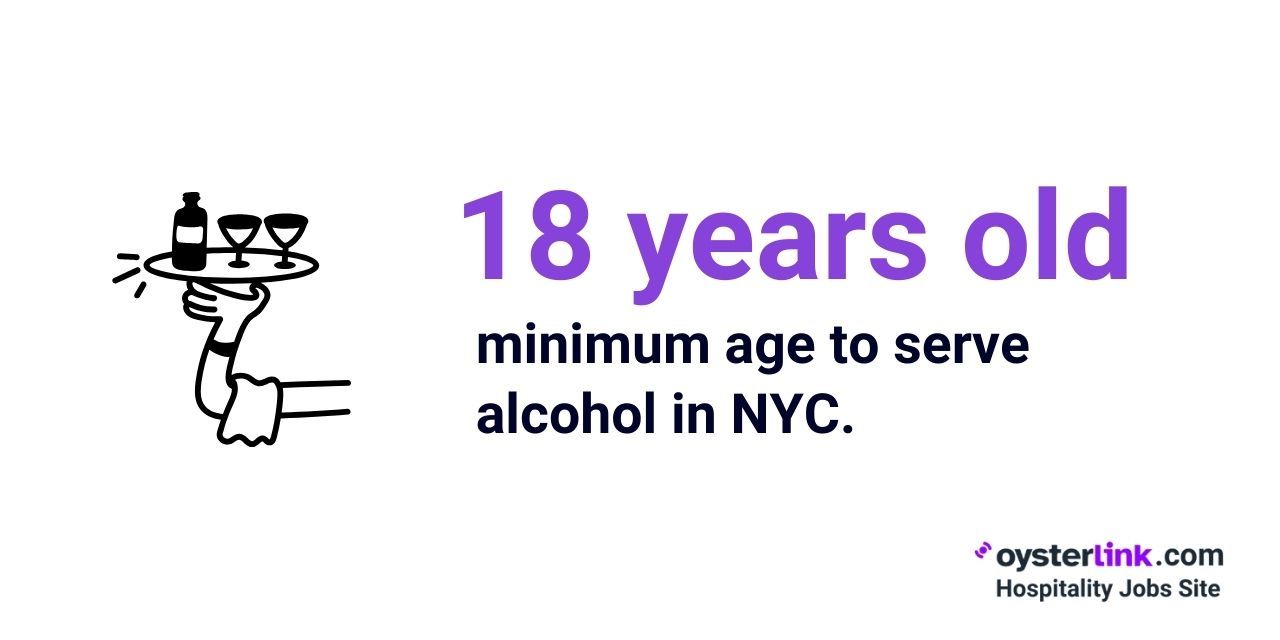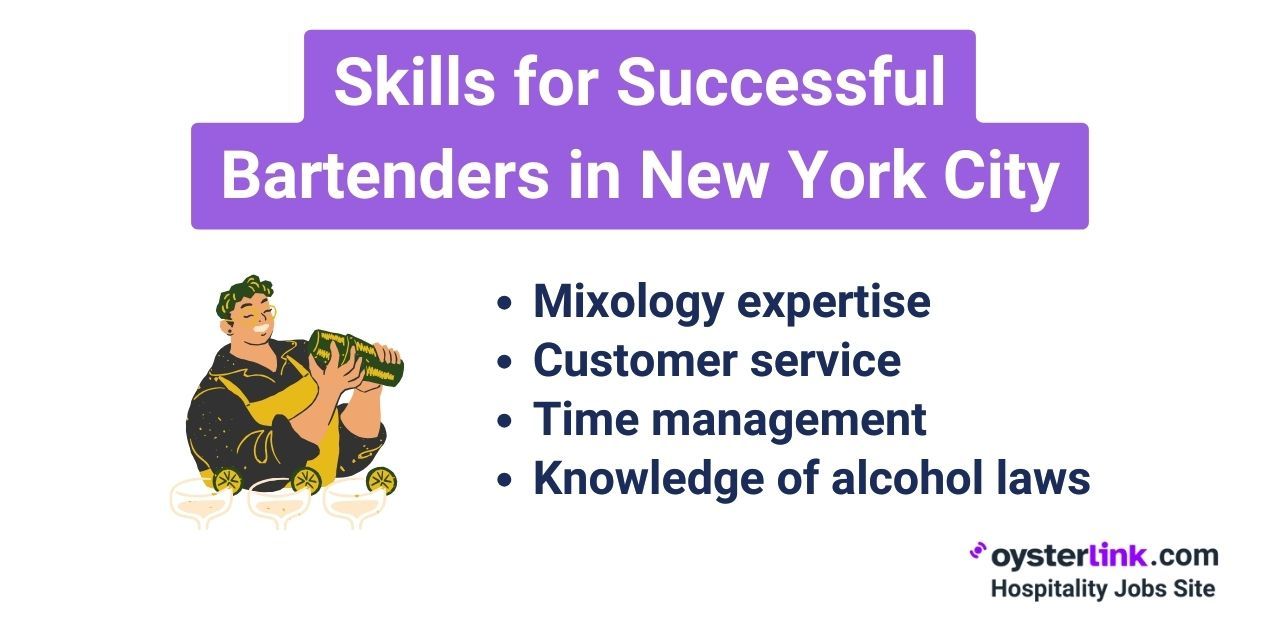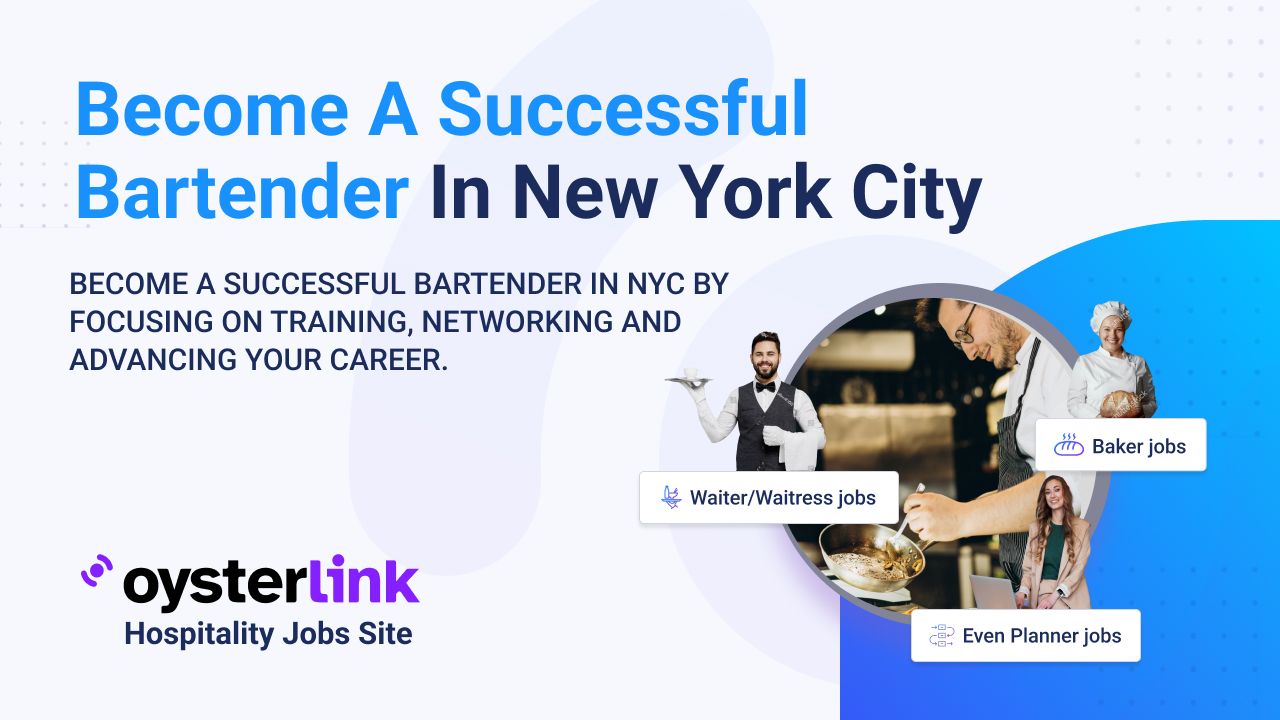Become a Successful Bartender in New York City: Key Takeaways
- Individuals must be at least 18 years old to serve alcohol in NYC and must have no disqualifying felony convictions or must obtain a Certificate of Relief from Disabilities.
- Completion of the Alcohol Training Awareness Program (ATAP) is highly recommended though not mandatory; it improves employability and educates on responsible alcohol service.
- The average annual bartender salary in New York City is about $27,838, with tips playing a crucial role in overall earnings.
Discover the essential steps and skills needed to become a successful Bartender in New York City. This guide outlines legal requirements, training options and career tips.
For employers looking to attract top talent, learn how to hire a Bartender that customers love.
Legal and Age Requirements for Bartenders in NYC
In New York City, you must be at least 18 years old to bartend legally. This is the minimum age to serve alcohol in any licensed establishment.

Additionally, those with felony convictions generally cannot bartend unless they secure a Certificate of Relief from Disabilities, which legally removes certain employment barriers.
These regulations help maintain safety and compliance within NYC’s nightlife scene and should be your first consideration before pursuing bartending.
Understand more about the legal age to serve alcohol to ensure you meet all requirements.
Bartending License and Training Requirements in New York City
Unlike many other states, New York City does not require a formal bartending license to work behind the bar.
While over 70% of Bartenders nationwide report that the role has no minimum education requirement, most employers in NYC still look for some form of training or prior experience.
The New York State–approved Alcohol Training Awareness Program (ATAP) is the most notable course. It covers essential topics such as responsible service techniques, effects of alcohol and how to check IDs properly.
Completing ATAP can enhance your hiring prospects since many employers view it as a mark of professionalism.
Moreover, establishments that employ ATAP-certified bartenders may benefit from reduced penalties in the event of alcohol-related legal infractions.
Employers can also find valuable insights on how to hire high performers to improve their bar teams.
Where To Get Bartending Training in NYC
Several schools and agencies provide high-quality bartending education, including the Columbia Bartending Agency and the School of Mixology. These programs offer hands-on instruction combined with mixology theory to prepare students for the real demands of the job.
Attending such courses not only teaches drink recipes and mixing techniques but also enhances your confidence and customer service skills—both crucial for success behind the bar.
If you want detailed career information, explore the comprehensive Mixologist career overview for more insights related to bartending and mixology.
Key Skills for Successful Bartenders in New York City

Thriving as a bartender in NYC means more than just pouring drinks. You’ll need to develop a variety of skills that set you apart in a competitive market.
- Mixology Expertise: Learn to craft classic cocktails and innovate new recipes that appeal to diverse patrons.
- Customer Service: Master engaging with customers warmly and professionally while managing busy periods smoothly.
- Time Management: Effectively handle multiple drink orders simultaneously, maintaining speed and accuracy during peak hours.
- Knowledge of Alcohol Laws: Stay informed about state and local regulations to ensure compliance and responsible service.
Strong communication and multitasking abilities combined with well-rounded drink knowledge establish you as a reliable and skilled bartender.
Develop your brand further by reading how to build your Bartender brand for professional growth.
Networking and Experience Tips To Become a Successful Bartender in NYC
Entry-level positions and internships are great ways to gain hands-on bartending experience in New York City.
Working as a Barback or Server can give you crucial insights into the industry and allow you to develop relationships with managers and fellow bartenders.
Networking is critical in NYC’s hospitality scene. Since studies show that roughly 70% of jobs are filled through referrals rather than online postings, building personal connections can make the difference in landing opportunities.
Attend industry events, participate in bartending competitions and connect with local bars and agencies. These contacts can lead to valuable job referrals and mentorship opportunities.
Take advantage of bartending community connections by joining bartending communities.
Salary Expectations for Bartenders in New York City
As of early 2025, the average annual salary for a bartender in New York City is roughly $27,838, with typical earnings ranging between $24,586 and $31,689.
Importantly, tips constitute a significant portion of bartenders’ income, often exceeding base wages.
Exceptional customer service and upselling skills can greatly increase your tips, substantially boosting your total earnings.
Learn more about bartender pay with detailed Bartender salary information on OysterLink.
Essential Resources To Become a Successful Bartender in NYC
To stay informed and compliant, utilize official resources that provide up-to-date information and training:
- New York State Liquor Authority: Offers detailed regulations on alcohol service and licensing.
- New York State Department of Labor: Provides employment standards and tips on workplace practices.
These websites are vital for understanding legal stipulations, training programs, and employment opportunities in NYC’s bartending industry.
For employers looking for strategies, check out Bartender performance review examples to maintain a high-performing bar staff.
Becoming a Successful Bartender in New York City: Conclusion
Success as a bartender in New York City hinges on meeting legal requirements, obtaining relevant training, and continuously honing essential skills like mixology and customer service.
While no formal license is required, completing ATAP and gaining practical experience will greatly enhance your employability and career growth.
Coupling dedication with effective networking enables you to thrive in NYC’s vibrant and demanding bartending profession.
If you're seeking guidance on how to navigate your career transitions within hospitality, the jobs after bartending guide can offer useful perspectives.


.webp)
.webp)

